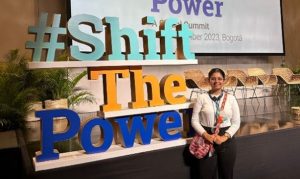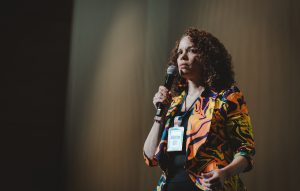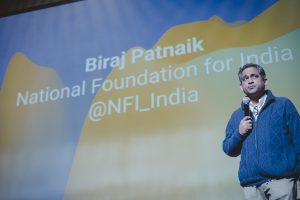International philanthropy needs a strategy for human rights, well-being, justice and peace
31 Jan 2024
This blog originally appeared on the Adolescent Girls Investment Plan website, and in Alliance magazine’s special feature on the #ShiftThePower Global Summit.

Pooja Singh, Girl and Youth Engagement Specialist at Adolescent Girls Investment Plan
Recently, I had the great privilege to attend the #ShiftThePower Global Summit in Bogotá, Colombia as a GFCF travel grant recipient. As I sit in the comfort of home reflecting on the whirlwind experience of the Summit, I realize there is much to celebrate and learn from, both in terms of how the Summit was organized and what each participant brought to the convening.
This reflection would not be complete without gratitude to TerritoriA and the GFCF for making all the visa-related information and documents available in a simplified and timely manner. Having had the opportunity to attend other conferences in the past, this was the smoothest process I have experienced so far.
The overall Summit design remains a highlight for me. With a late start on Day 1 and 5pm closures, long lunch breaks, plenty of coffee breaks, limited number of parallel sessions, and fun reception experiences on all three days, I managed to not just engage with the content but also absorb and retain it. Moreover, the intentional pace of the Summit allowed me to interact with people beyond their job and project descriptions, leaving me with a sense of newfound friendships within the feminist allyship that I really cherish at present.
“#ShiftThePower is a mobilizing force that seeks to highlight, harness, resource, legitimize and join up these new ways of ‘deciding and doing’ that are emerging around the world under the larger umbrella of movement generosity so that it can galvanize a vision of a good society and serve as a force for genuine and lasting change.”
The Summit brought together 700 people from 70 countries to contribute to this global conversation on reshaping international funding systems to be more locally-led and owned, putting communities in charge of their development.
Key notes from the Summit
(Notes are not direct quotes but have been paraphrased by the author)
1. Nana Afadzinu, West Africa Civil Society Institute (Ghana): Drop the logos, egos, and siloes – together we can do so much more.
2. Magda Pocheć, FemFund (Poland): Five strategies on power shifting: intersectional organizing, facilitating solidarity amidst different communities, value local change, regenerative activism, and transformative leadership.
3. Kelly Bates, Interaction Institute for Social Change (United States): The skills required for healing are not soft skills. They are deeply necessary for life on a planet that is deeply suffering.
4. Sohier Assad, Rawa Creative Palestinian Communities Fund (Palestine): The story of Gaza is a story of colonization and colonization is tied to capitalism. It shows whose bodies have been exploited to serve the economic interests of those holding the most power.
5. Amibika Satkunanathan, Neelan Tiruchelvam Trust (Sri Lanka): There is an urgent need to acknowledge that structural violence exists within the development sector. It is critical to ask if our philanthropy is truly dismantling such power structures or reinforcing them?
6. Marta Ruiz, Journalist and former Commissioner of Truth (Colombia): Peace building is not just an agreement. Empathy, justice, healing, and reconciliation in peace building work is essential. Read Marta Ruiz’s Summit keynote address here.
7. Barry Knight, GFCF (United Kingdom): Data collection needs to move from being a cold, bureaucratic process towards centering emotions and moral imagination in how impact and success is measured. At present, the donors are asking for the wrong data.
8. Marie-Rose Romain Murphy, Haiti Community Foundation (Haiti): Persistence is power, and hope is a strategy. International donors need to reflect on how the impact the self-reliance and local expertise when extending aid without centering local leadership.
9. Rita Thapa, founder of Tewa (Nepal): International aid actors need to reflect on the power structure they reinforce through their practices. This a critical need to reassess who we feel accountable towards. Watch this video with Rita Thapa’s take on #ShiftThePower.
10. Biraj Patnaik, National Foundation for India (India): Can we really shift power without shifting the economic system? Geo-politics can trump all solidarity and there is a need to continue speaking truth to power.
11. Hibak Kalfan, NEAR Network (United States): Donors and civil society organizations need to humble themselves and truly reflect on whether their interventions actually work and, if not, remain open to learning and leaning in on community knowledge and solidarity. Always ask: how can I help you?
While we were discussing different ways in which power is concentrated and exercised, the current state of world affairs with worsening war, conflicts, and genocide did not go unnoticed. There was a clear understanding that the geo-politics and economic interests of those holding the most power lacks any understanding of human rights and well-being, humanitarian justice and peace. The powerlessness of international institutions in de-escalating the situation and meditating peace has never been more evident. Summit participants also clearly articulated the inherent issues around how international philanthropy currently operates, and raised several challenging recommendations for philanthropists and grant-makers to reflect on their practices and adopt a more community-centric approach that prioritizes local leadership.
While the realities are dark, the Summit was an encouraging space to cross-learn on ways to continue challenging the power structures in our homes, organizations, and communities to whatever extent possible because hope is a strategy, and we need to practice what we preach.
By: Pooja Singh, Girl and Youth Engagement Specialist at Adolescent Girls Investment Plan





